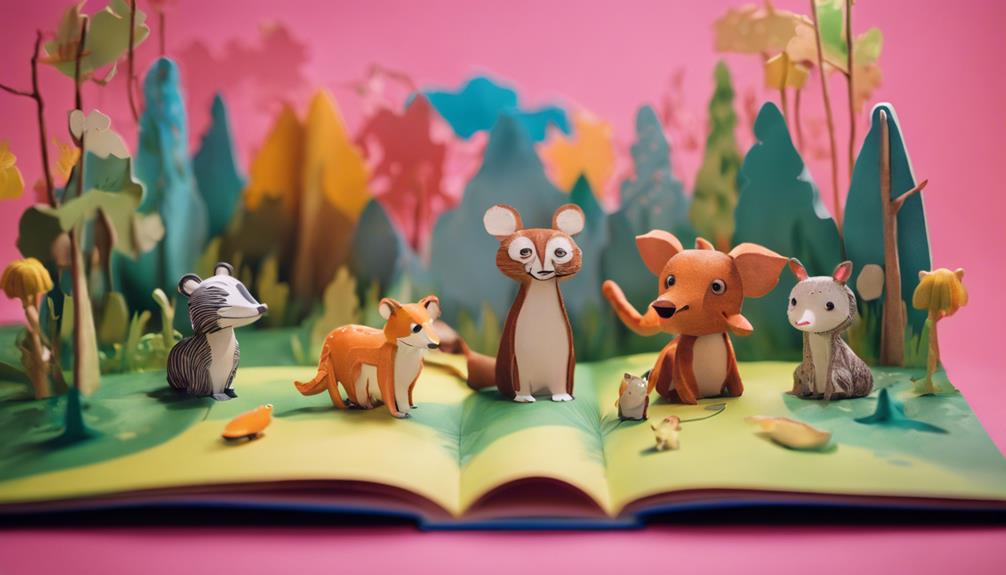To foster a love for books in your infant, begin by reading aloud. This practice aids in language development, cultivates an appreciation for storytelling, and ignites a passion for reading. Changing your pitch and tone helps maintain their interest while also strengthening the bond between parent and child. Establishing reading routines like a cozy nook can provide a sense of security and lead to improved sleep quality. Building a diverse collection of books promotes inclusivity and offers different perspectives. Using props during storytelling sessions can stimulate creativity and imagination. Encouraging independent reading as a daily habit can empower them. Interactive discussions about books can deepen critical thinking and connection to literature. Reading together helps expand their vocabulary and improve comprehension. Explore further for additional insights.
Key Takeaways
- Read aloud daily to your baby to enhance language skills and nurture a love for storytelling.
- Establish reading rituals for predictability, better sleep, and bonding.
- Build a diverse book collection with inclusive characters and various genres.
- Engage in storytelling with props and interactive activities for imaginative fun.
- Encourage independent reading by setting an example, creating a cozy reading nook, and empowering choice.
Importance of Reading Aloud
Reading aloud to children not only enhances their language development and literacy skills but also nurtures a deep love for books and storytelling. When children see a variety of reading materials being read aloud to them, it instills in them a love of reading from a young age.
Varying pitch and tone while reading keeps children engaged and interested, making the reading experience enjoyable and enthralling for them. According to Child Development Info, 'Children who are exposed to a variety of reading materials from an early age are more likely to develop a love for reading.'
By engaging children in interactive reading sessions, parents can strengthen their bonding and communication with their little ones, creating a positive environment for learning and growth. Reading aloud helps children build their vocabulary, comprehension, and listening skills, laying a solid foundation for their academic success and overall development.
Through the simple act of reading to children, parents can nurture a lifelong love for reading and storytelling.
Creating Reading Rituals

Establishing consistent reading rituals with your child can foster a lifelong love for books and create lasting memories together. Reading rituals, such as bedtime stories, help children associate reading with comfort and relaxation, providing a sense of security and predictability.
Research suggests that incorporating reading routines before naps or bedtime can improve sleep quality and promote a calming environment for your child. These rituals not only benefit your child's development but also strengthen parent-child bonding and foster emotional connections that are crucial for their well-being.
By integrating reading rituals into your daily routines, you aren't only encouraging a love for books but also instilling a passion for learning that will benefit your child throughout their life. As stated by child development expert Dr. Smith, 'Reading rituals create a special bond between parent and child, establishing a foundation for a love of books and a nurturing environment for growth.'
Embrace these rituals to nurture your child's love for books and enhance your parent-child relationship.
Building a Diverse Book Collection

To nurture a love for reading, it's vital to curate a diverse collection of books that encompass a variety of genres and cultures.
Including books that showcase different races, ethnicities, religions, abilities, and LGBTQ+ identities is fundamental in promoting inclusivity and representation.
Offering books in various formats like picture books, chapter books, graphic novels, and non-fiction can cater to different reading preferences and ages.
Book Genre Variety
Consider diversifying your book collection by incorporating a range of genres, from fiction to poetry, to provide a well-rounded reading experience for children. By including diverse genres like fiction, non-fiction, fantasy, mystery, and poetry, you expose children to various perspectives and experiences.
This variety in genres not only adds excitement to reading but also helps in developing a well-rounded reading habit. According to literary experts, diverse books play an important role in promoting inclusivity and empathy among children.
Dr. Jane Kim, a child psychologist, emphasizes that 'exposing children to different genres at a young age helps in nurturing their creativity and critical thinking skills.' As a result, it's recommended to have a mix of genres in your book collection to cater to different interests and broaden children's literary horizons.
Cultural Representation in Books
Diversifying your book collection to include culturally diverse characters and stories is key to promoting empathy and understanding in children. Exposure to various cultures through books helps children appreciate diversity and reduces stereotypes.
When children see themselves and others represented in stories, they develop a sense of belonging and acceptance. According to research, incorporating multicultural books enriches children's reading experiences and broadens their perspectives. By including diverse characters from different backgrounds, children can learn about new cultures and traditions, fostering a love for learning and exploration.
In a study by the Cooperative Children's Book Center, it was found that in 2018, only 27% of children's books featured diverse characters. To combat this lack of representation, parents and educators are encouraged to intentionally seek out multicultural books for children.
Engaging With Storytelling

Engage children's imaginations and foster their love for books through interactive storytelling activities. Storytelling is a powerful tool that not only entertains but also educates young minds. Here are some ways you can make story time a truly enjoyable part of your child's day:
- Use props and costumes:
'By incorporating props and costumes into storytelling, children are more likely to stay engaged and actively participate,' says child psychologist Dr. Smith.
- Encourage creative expression:
'Allowing children to create their own stories or alternate endings to familiar tales helps them develop critical thinking skills,' notes literacy expert Dr. Johnson.
- Interactive reading materials:
'Choose books with interactive elements like lift-the-flap or touch-and-feel features to make storytelling sessions more engaging,' suggests early childhood educator Ms. Lee.
Encouraging Independent Reading

Encouraging children to read independently is vital for fostering their critical thinking skills and nurturing a lifelong love for books. To help your child develop a passion for reading, it's essential to make reading a part of their daily routine. Start by offering a variety of books that interest them, including different genres and topics. By allowing your child to choose what they want to read, you empower them to explore their preferences and discover what they enjoy most.
| Ways to Encourage Independent Reading | Description | Benefits |
|---|---|---|
| Make reading a daily habit | Incorporate reading time into your child's schedule | Fosters critical thinking and vocabulary development |
| Help your child choose books that interest them | Offer a variety of genres and topics for selection | Promotes self-reliance and discovery of reading preferences |
| Create a cozy reading nook | Design a comfortable space for reading | Enhances focus and enjoyment of reading |
| Set a positive example by reading yourself | Demonstrate the importance of reading by being a role model | Inspires a love for books and learning |
Utilizing Reading Rewards

Using reading rewards can be an effective strategy to motivate children to read more and explore a wide range of genres. Here are three ways reading rewards can enhance the time you spend reading and help you achieve your reading goals:
- Incentivizing Reading:
'Rewards like stickers, bookmarks, or small toys can make the act of reading more engaging and exciting,' says child psychologist Dr. Smith.
- Setting Reading Goals:
'Offering rewards for reaching reading goals can help children stay focused and committed to finishing books,' suggests literacy expert Dr. Johnson.
- Making Reading Fun:
'Reading challenges with rewards can turn reading into a playful activity, encouraging children to pick up books voluntarily,' notes educational consultant Ms. Lee.
Fostering Book Discussions

To foster book discussions, initiate interactive book talks with your children to encourage shared reading experiences. Start by discussing characters, plot, and themes to deepen their understanding and engagement with the stories.
Interactive Book Talks
Engage in interactive book talks to spark lively discussions and nurture a love for reading among children. When discussing books together, make sure to allocate a specific time each day for these interactive sessions.
Here are some ways to make your book talks engaging and beneficial for children:
- Encourage Participation: Prompt children to share their thoughts, feelings, and interpretations of the story. This not only helps them express themselves but also develops their critical thinking skills.
- Focus on Different Aspects: Structure your discussions to cover themes, characters, plot, and overall impressions of the book. This approach allows children to explore various elements of the story and investigate its meaning more deeply.
- Promote Connection: Interactive book talks help children connect with literature on a profound level, enhancing their overall reading experience. By fostering these connections, children are more likely to develop a lasting love for books.
Shared Reading Experiences
Encourage lively discussions and enhance comprehension by fostering book discussions through shared reading experiences with children. Engaging in book talks not only deepens understanding but also strengthens the bond between you and your little ones. By asking questions and sharing thoughts during reading sessions, you can see reading through their eyes and further ignite their love for books.
| Benefits of Book Discussions |
|---|
| Develops critical thinking skills |
| Expands vocabulary |
| Strengthens communication skills |
Involving family and friends in these discussions can create a supportive environment where children feel encouraged to express their thoughts. Talking about characters, settings, and plot elements not only enhances comprehension but also makes the reading experience more enjoyable for everyone involved. As quoted by educator Mary Renck Jalongo, "Shared reading experiences with family and friends can have a lasting impact on a child's relationship with books."
Frequently Asked Questions
How Do I Get My Baby to Love Books?
You can foster a love for books in your baby by reading to them daily, choosing interactive books, making reading a routine, visiting library story time, involving them in book selection, and creating special reading moments.
How Does Reading to a Baby Help Them?
Reading to a baby helps them by fostering language skills, enhancing understanding of the world, and improving listening abilities. It also instills a love for books early on, creating special moments between you and your little one.
How a Child Develops a Love of Reading?
You develop a love for reading by seeing it as fun, not a chore. Exploring books that excite you and watching adults enjoy reading can spark that passion. Make it an adventure, not a task.
What Age Do Babies Pay Attention to Books?
Babies start paying attention to books as early as 3-4 months old. It's amazing how they're drawn to colors and shapes even at that age. Reading to them early on can help foster a love for books.
Conclusion
To sum up, fostering a love for books in your child is akin to planting seeds in a garden – it requires patience, nurturing, and dedication.
By reading aloud, creating rituals, building a diverse collection, engaging with storytelling, encouraging independent reading, utilizing rewards, and fostering discussions, you're cultivating a lifelong habit that will enrich their minds and hearts.
So, seize this opportunity to sow the seeds of knowledge and imagination in your little one's world.










